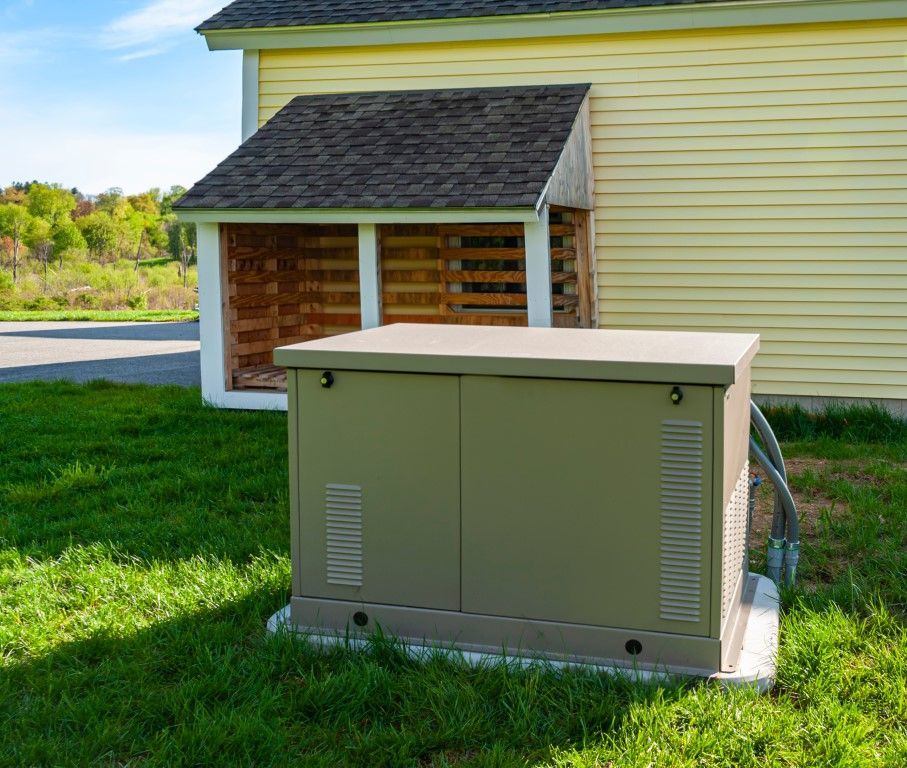
Residential Generators in Norfolk VA
A residential generator is a backup power source designed to supply electricity to a home when the main power grid fails. This essential appliance ensures that your home remains powered during outages caused by storms, blackouts, or other disruptions. By converting mechanical energy into electrical energy, a generator provides a reliable solution to maintain your household's functions, from lighting and heating to appliances and electronics.
Key Features to Consider
When choosing a residential generator, several features should be considered to ensure it meets your needs effectively. Look for a generator with the right power capacity to handle your household's electrical requirements. Key features include fuel type options such as gasoline, propane, or natural gas, which can impact convenience and operational costs. Additionally, consider the generator's runtime, noise levels, and the presence of automatic transfer switches that facilitate a smooth transition from grid power to generator power without manual intervention.
How It Works
Residential generators operate by using an engine to convert fuel into mechanical energy, which is then transformed into electrical energy by an alternator. When the main power supply is interrupted, an automatic transfer switch detects the outage and signals the generator to start. Once the generator is running, it supplies power to the home through a dedicated circuit or directly to the electrical panel. This seamless process ensures that your home remains functional without interruption during power outages.

We will get back to you as soon as possible.
Please try again later.
Installation Considerations
Proper installation is crucial for the effective operation of a residential generator. The generator should be placed on a stable, level surface, ideally in a location that minimizes noise and exhaust exposure to living areas. Professional installation is recommended to ensure compliance with local codes and regulations. This process includes setting up fuel lines, electrical connections, and configuring the automatic transfer switch. Proper placement and installation help prevent potential issues and ensure that the generator performs optimally when needed.
Maintenance and Safety
Regular maintenance is essential to keep your residential generator running smoothly and to extend its lifespan. This includes routine checks of oil levels, air filters, and fuel systems, as well as periodic testing to ensure readiness during power outages. Safety measures should also be taken seriously, including ensuring proper ventilation to prevent carbon monoxide buildup and keeping the generator away from flammable materials. Following the manufacturer’s maintenance schedule and safety guidelines helps prevent malfunctions and ensures the generator operates safely and efficiently.
Cost Factors
The cost of a residential generator can vary widely based on several factors, including the generator’s power capacity, type, and brand. Installation costs also contribute to the overall expense, as professional setup and any necessary modifications to your home’s electrical system can add to the total price. Additionally, consider ongoing costs such as fuel, maintenance, and potential repairs. Investing in a high-quality generator and proper installation can help avoid future costs and ensure reliable performance during power outages.
If you're considering a
residential generator in Norfolk, VA, reach out to us today for expert advice and service. Our team can help you choose the right generator based on your specific needs, ensure professional installation, and provide ongoing support and maintenance. Don’t wait for the next power outage—secure your home’s energy needs and enjoy peace of mind knowing you’re prepared for any unexpected disruptions. Contact us now to get started and ensure your home remains powered and protected.
How to Prepare Your Home for a Residential Generator Installation
A residential generator is a device that provides backup power to your home when the main power source fails. Unlike portable generators, which are typically used for short-term needs, residential generators are permanently installed and connected to your home’s electrical system. They automatically start when there’s a power outage, supplying electricity to essential circuits, ensuring that you stay comfortable and your appliances keep running. When it comes to ensuring your home remains powered during unexpected outages, a residential generator is a practical solution. To make the installation process smooth and effective, proper preparation is key. Here’s a guide on how to get ready for your residential generator installation.

Assess Your Power Needs
Before installation, evaluate which appliances and systems you want the generator to support. This includes deciding if you need the generator to power the whole house or just critical systems like heating, refrigeration, and medical equipment. Knowing your power needs will help you choose the right size and type of generator.
Choose the Right Location
Generators should be installed outdoors, away from windows, doors, and vents to prevent exhaust fumes from entering your home. Common locations include a side yard or the back of your property. Ensure the area is level and has enough space for both the generator and the installation crew to work safely.
Prepare the Site
Clear the installation area of any debris, plants, or obstacles. Make sure there is adequate drainage to avoid water accumulation around the generator. In some cases, you may need to prepare a concrete pad or a gravel base to provide a stable and level surface for the generator.
Check Electrical Connections
Ensure that your home’s electrical system is up to code and can handle the new generator. An electrician will typically need to install a transfer switch, which allows the generator to connect safely to your home’s electrical system. If you have an older electrical panel, it may need updating to accommodate the generator.
Secure Permits
Depending on your local regulations, you may need a permit to install a generator. Contact your local building department to find out what permits are required and ensure that all necessary approvals are in place before installation begins.
Prepare for Installation Day
On the day of installation, make sure that the installation area is accessible. The installation crew will need to move equipment and may require access to your home’s electrical panel. It’s a good idea to clear a path and ensure there’s no restricted access.
Maintenance Considerations
Once your generator is installed, regular maintenance is crucial to ensure it functions properly when needed. Follow the manufacturer’s guidelines for routine maintenance, which often includes checking oil levels, cleaning filters, and testing the system.
Preparing for a residential generator installation involves several important steps to ensure that the process goes smoothly and that the generator will perform effectively when you need it most. If you have any questions about the installation process or need assistance with preparing your home, don’t hesitate to contact us. Our team is here to help guide you through every step of the installation process and ensure that your home is ready for reliable backup power. Reach out to us today to get started on securing your home’s power with a professionally installed residential generator.
Preparing for Power Outages: Why Every Home Needs a Residential Generator
Power outages can disrupt daily life, whether caused by severe weather, technical failures, or other unforeseen issues. While it's impossible to predict when an outage might occur, it's essential to be prepared to minimize its impact. One of the most effective ways to ensure your home remains functional during a blackout is by investing in a residential generator. This device provides a reliable power source when the grid goes down, keeping your household running smoothly and safely. A residential generator is not just a luxury but a practical solution for various reasons. Here's why every home should consider having one:
Uninterrupted Power Supply
A generator provides a continuous power supply during an outage, ensuring that essential appliances and systems, such as refrigerators, heating or cooling units, and medical equipment, remain operational. This continuity is crucial for preserving food, maintaining a comfortable environment, and supporting any health needs that require electricity.
Safety and Security
During a power outage, security systems and lighting often go offline, leaving homes vulnerable. A generator can power security cameras, alarms, and exterior lights, enhancing safety and deterring potential intruders. Additionally, it helps avoid dangerous situations like freezing pipes or spoiled food that could pose health risks.
Convenience
Without power, daily routines are disrupted. Tasks like cooking, cleaning, and entertainment become challenging. A generator allows you to use appliances like stoves, microwaves, and even your TV, making life more convenient during outages. This ease of use can be a significant relief during stressful situations.
Increase Home Value
Installing a residential generator can increase your home's value. Potential buyers often view a backup power system as a valuable feature, providing an extra layer of security and comfort. This added value can be beneficial if you decide to sell your home in the future.
Peace of Mind
Knowing you have a backup power source can significantly reduce stress and anxiety during outages. You won't have to worry about scrambling for candles or worrying about how long the blackout will last. A generator ensures that you are prepared and can handle any situation calmly.
Cost-Effective Long-Term Investment
While the initial cost of purchasing and installing a generator might seem high, it is a cost-effective investment in the long run. By preventing potential damage to your home or possessions and reducing the inconvenience of outages, you save money over time. Additionally, modern generators are designed to be efficient and durable, offering reliable performance for many years.
Investing in a residential generator is a wise decision to safeguard your home against power outages. If you're ready to enhance your home's preparedness and ensure that you remain comfortable and secure during any blackout, contact us today. Our team can help you select the right generator for your needs, handle installation, and provide ongoing support. Don't wait for the next power outage to catch you off guard—take action now and enjoy the peace of mind that comes with being well-prepared.
Let's Connect!
Are you tired of worrying about power outages? Look no further than us. Our experienced team is dedicated to providing reliable and efficient generator installation and maintenance services. With a generator from us, you can rest easy knowing that your home or business will stay powered during unexpected outages. Don't wait until the next storm hits - hire us today and enjoy the peace of mind that comes with reliable backup power!